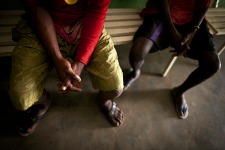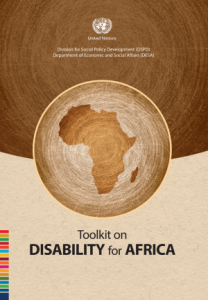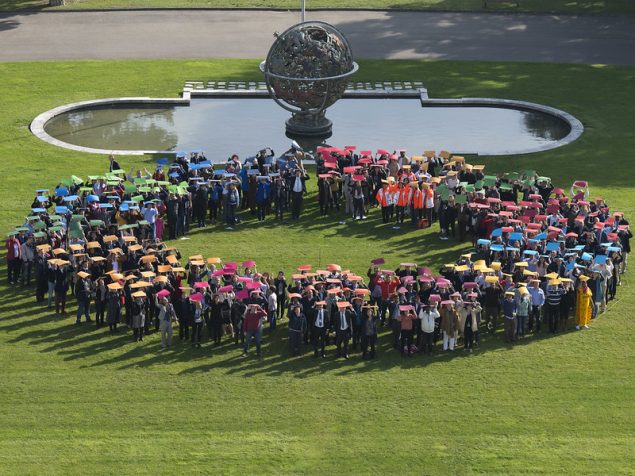 The relationship between HIV/AIDS and disability is a cause for concern as persons with disabilities are often at higher risk of exposure to HIV. Additionally, there is a growing understanding that persons living with HIV or AIDS are also at risk of becoming disabled on a permanent or episodic basis as a result of their condition.
The relationship between HIV/AIDS and disability is a cause for concern as persons with disabilities are often at higher risk of exposure to HIV. Additionally, there is a growing understanding that persons living with HIV or AIDS are also at risk of becoming disabled on a permanent or episodic basis as a result of their condition.
Like any other person, persons with disabilities require information on HIV/AIDS and access to programmes, services, and resources. In most countries, the situation of persons with disabilities is further compounded by societal barriers that hinder their full and effective participation in society, including access to education. Despite the growing relationship between HIV/AIDS and disability, persons with disabilities have not received sufficient attention within national responses to HIV and AIDS. Furthermore, existing HIV prevention, treatment, care and support programmes generally fail to meet their specific needs. Persons with disabilities are often excluded from HIV education, prevention and support services because of assumptions that they are not sexually active or do not engage in other risk behaviours such as drug use.
Sexual and reproductive health service providers may lack knowledge about disability issues, or have misinformed or stigmatizing attitudes towards person with disabilities. Services offered at clinics, hospitals and in other locations may be physically inaccessible, lack sign language facilities or fail to provide information in alternative formats such as Braille, audio or plain language. In places where there is limited access to medication, persons with disabilities may be considered a low priority for treatment.
Women and girls with disabilities are especially vulnerable to sexual assault or abuse. Persons with intellectual impairments and those in specialized institutions are also at particularly high risk. Around the world, children with disabilities are a large proportion of the children and persons with disabilities not enrolled in school, which results in their exclusion from vital sexual and reproductive health education that is often provided in school settings. Low literacy levels and a lack of HIV prevention information in accessible formats, such as Braille make it all the more difficult for persons with disabilities to acquire the knowledge they need to protect themselves from being infected.
Persons with disabilities are seldom recognized as a group to be included in the national response to HIV/AIDS. Integrating their specific needs is a crucial component to mitigate the worsening condition of persons with disabilities. The failure to understand and provide essential information to persons with disabilities concerning HIV/AIDS, results in their increasing marginalization. Work on HIV/AIDS issues at all levels, local, national, regional and global levels, should consider the rights and needs of persons with disabilities through the design of legislation, funding structures, policies, and programmes. HIV/AIDS professionals and advocates can help create a dialogue with and within the disability community to foster more open discussion of HIV/AIDS issues.
The Convention on the Rights of Persons with Disabilities provides a global policy framework to promote the equal rights to health for persons with disabilities, including sexual and reproductive health, on par with those without disabilities and enable policies to implement AIDS programming for persons with disabilities and programmes to fight against stigma, discrimination and other barriers faced by persons living with HIV/AIDS, Some countries have adopted anti discrimination laws and other measures that explicitly cover discrimination on the basis of HIV/AIDS.
Events
AIDS 2016: “Access Equity Rights Now”
21st International AIDS Conference, July 18-22, 2016, Durban, South Africa. Call for Abstracts (Deadline 4 February 2016)
General Assembly High-Level Meeting on HIV/AIDS, 8-10 June 2011The United Nations General Assembly High-Level Meeting on HIV/AIDS to be held at UN Headquarters from 8-10 June 2011 will conduct a comprehensive review of the progress achieved in realizing the Declaration of Commitment on HIV/AIDS and the Political Declaration on HIV/AIDS. Representatives of non-governmental organizations in Consultative Status with the Economic and Social Council, civil society organizations and the private sector, will also be included in the list of speakers for the plenary meetings of the High-Level Meeting.
Side-event: AIDS & Disability-Partners Forum
General Assembly Civil Society Hearings on HIV/AIDS, 8 April 2011
Prior to the High-Level Meeting on HIV/AIDS, a one day informal interactive hearing with civil society on 8 April will be chaired by the President of the General Assembly and organized with the active participation of people living with HIV and broader civil society. The objective of the hearing is to create a space where civil society, NGOs and the private sector can interact with Member States and offer input to the comprehensive review process. A summary of the hearings will be issued as a document of the General Assembly prior to the High-Level Meeting.
Resources on HIV/AIDS and Disability
UNAIDS/WHO/OHCHR
Disability and HIV Policy Brief
UNAIDS
Advancing the Sexual and Reproductive Health and Human Rights of People Living with HIV (2008)
World Bank/ Yale University
HIV/AIDS and Disability: Capturing Hidden Voices (2004)
Global Partnership for Disability and Development
Rape of Individuals with Disabilities: AIDS and the Folk Belief of Virgin Cleansing (2004)
Disability in National Strategic Plans on HIV and AIDS: A Review on the National Response to the Interrelations of Disability and HIV in Eastern and Southern Africa (HEARD, December 2009)
Netherlands Ministry of Foreign Affairs – VSO’s Right to Life Program
A Handbook on Best Practices Regarding HIV and AIDS for People with Disabilities: Services, Policy Advocacy, Programming (December 2009)
Health Canada
HIV/AIDS and Disability: Final Report of the 4th International Policy Dialogue (March 2009)
HEARD (Health Economics and HIV/AIDS Research Division)
HIV, Disability and Rehabilitation: Considerations for Policy and Practice (January 2010)
National Responses to Disability and HIV in Eastern and Southern Africa (February 2010)
Journal of International AIDS Society
HIV, disability and discrimination: making the links in international and domestic human rights law (2009)
Meeting report of the International Policy Dialogue on HIV/AIDS and Disability (2009)
The Fields of HIV and Disability: Past, Present and Future (2009)
African Campaign on AIDS and Disability
“The Forgotten’”: HIV and Disability in Tanzania
Kampala Declaration on Disability and HIV/AIDS (2008)




